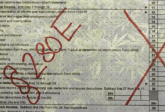Sprinkle a Little Fraud on that Doobie

Another Tax Court Win for the IRS vs. Cash Intensive Businesses in the Cannabis Industry
Mr. Chico, an entrepreneur and registered tax preparer, operates an ancillary cannabis business called Doob Tubes which he owns along with his wife. Doob Tubes makes containers for pre-rolled marijuana, but does not traffic in cannabis and is not subject to 280E. That didn’t stop an IRS auditor from tossing out all of Doob Tube’s COGS (cost of goods sold) for two tax years due to failure to provide substantiated beginning and ending inventory. Mr. Chico was also subject to back taxes and fraud-related penalties as the IRS unraveled his tax mess and subsequently discovered his failed dispensary business. The Tax Court agreed with the IRS’s assessment in a Memo, Chico v. Commissioner (Sept. 2019).
Since Doob Tubes are clearly for marijuana, and their dispensary customers are likely to make cash purchases of Doob Tubes, a failure to provide adequate books and records to the IRS compelled the Revenue Agent to reconstruct Doob Tubes’ income via a bank statement analysis. Although Mr. Chico had invoices on hand to demonstrate some of his Doob Tube manufacturing costs, he failed to calculate the beginning and ending inventory when preparing the tax returns – nearly a quarter-million ($241,486) of COGS were disallowed. The reconstruction of income from bank statements also revealed that Mr. Chico underreported Doob Tubes’ income over the years. As the IRS Agent applied audit techniques geared toward a cash-intensive business (cannabis-related), he revealed the alleged fraud. Fraud is defined in the Tax Court as “the intentional wrongdoing of a taxpayer to evade tax believed to be owing“. Since Mr. Chico was an informed decision-maker as a tax preparer, and gross income was understated consistently and substantially ($180,000+), the civil fraud penalty of 75% of the understatement of income was applied in addition to the accuracy-related penalty allotted to his wife (Ms. Chico avoided fraud penalties). Although the typical statute of limitations for opening a tax return audit is 3 years, substantial understatement of gross income can open the door for 6 years while there is no statute of limitations for civil tax fraud.
While scouring Doob Tube’s bank statements, the IRS Agent also discovered that Mr. Chico was the former owner and Chief Financial Officer of Lakewood Dispensary Colorado. Lakewood hadn’t filed its 2010 tax return, so the Revenue Agent prepared one for Mr. Chico who was the 100% owner of the dispensary during that year. Once again, no COGS were allowed due to lack of substantiation, but it gets worse; what was likely a return of capital to Mr. Chico became a taxable dividend. The return of capital is not taxable, so had he maintained adequate records and capital accounts, at least a portion of the money that Mr. Chico salvaged from Lakewood would have been tax-free. Instead, the IRS considered it an unreported dividend of $66,153.
It is your civic duty as a taxpayer to pay your fair share of taxes, but not a penny more. The Tax Court is clearly unforgiving of those who aren’t diligent in maintaining reliable books and records, especially in cash businesses where sales of inventory are an income-producing factor. The Chico’s racked up tax deficiencies of $183,816 which led to $137,863 in penalties on top of lawyer fees and stress. Proper cost accounting and good faith tax reporting may have saved them hundreds of thousands of hard-earned dollars, but more importantly, peace of mind.
Brian S. Whalen, CPA/ MST




